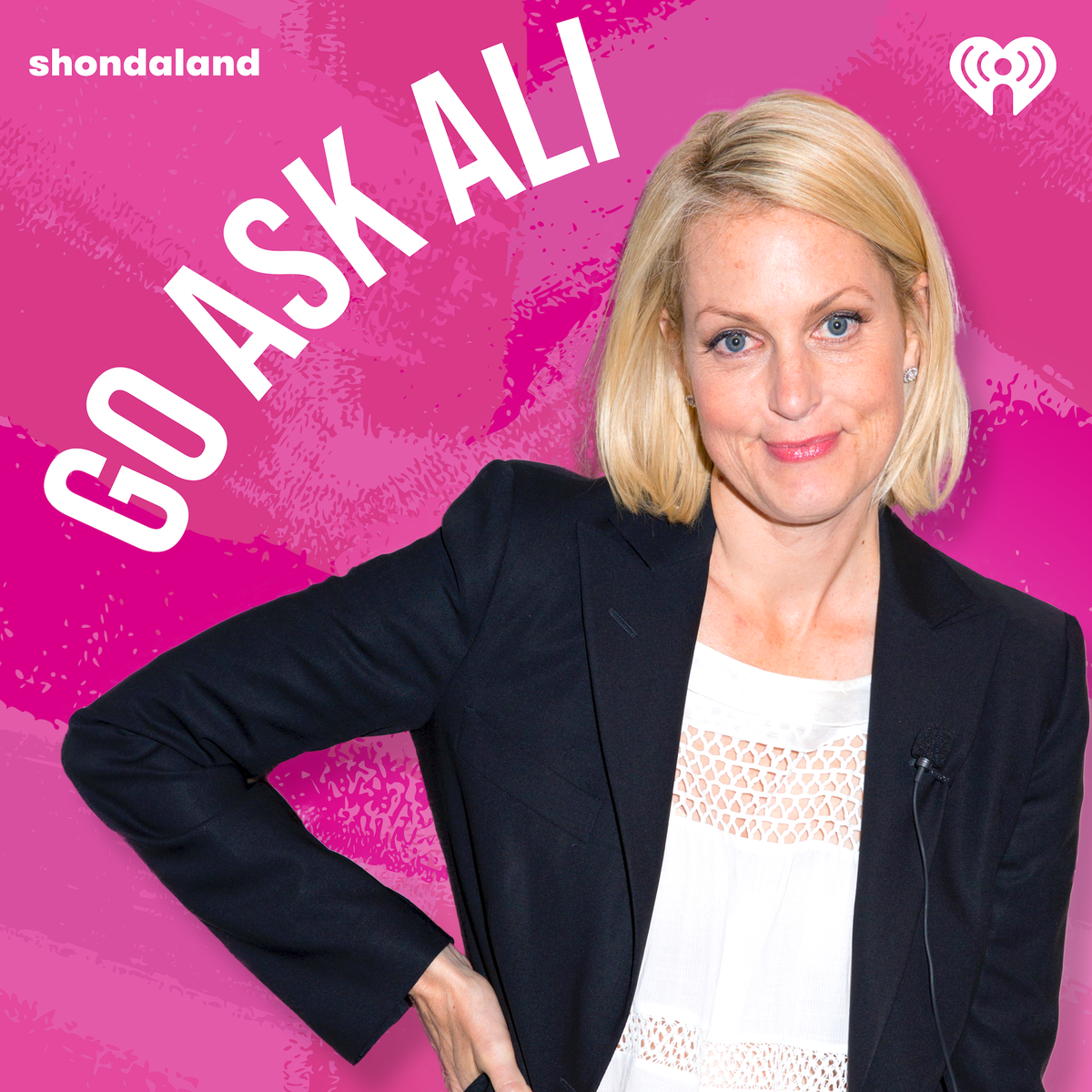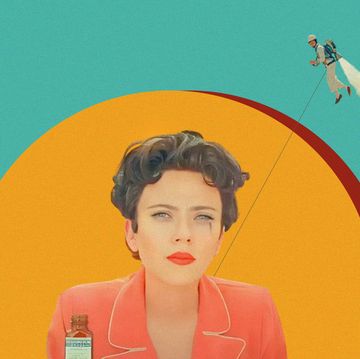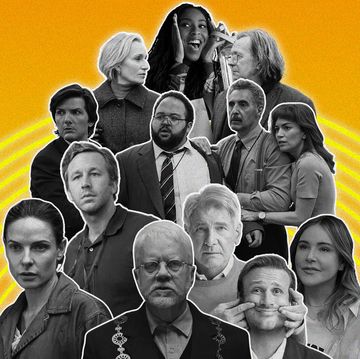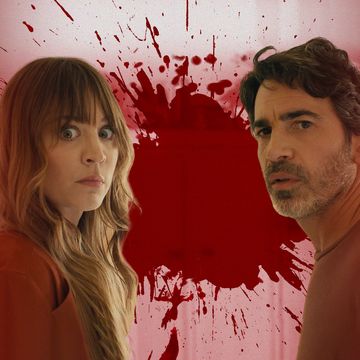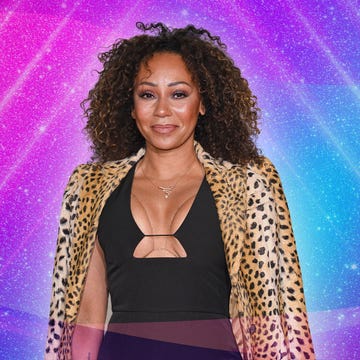While 2020 has been a year of dramatic change, it’s safe to say that no one has felt the loss of day-to-day consistency quite like teenagers. With schools shuttered, and their social lives upended in a way that not even Animal Crossing can fix, the burden of their mental state is shifted to parents, many who are simply just trying to manage their own ever-changing lives. That question — How do you keep children happy and healthy in a pandemic? — is what inspired Ali Wentworth’s new podcast, Go Ask Ali, one of three new podcasts launching this month as part of Shondaland Audio’s ongoing partnership with iHeart radio.
A multitasker at heart, Wentworth is a face you’re likely familiar with through her iconic roles in Jerry Maguire, Office Space, and Seinfield. She’s the host of the Daily Shot on Yahoo!, regularly stops by Good Morning America (most recently detailing how she caught and recovered from COVID), and has even written several books filled with wry self-help observations and tips. But she’s also the mother of two teenagers, a role she points out isn’t one-size-fits-all. Which is why she’s invited friends and experts along to untangle the thorniest of issues that emerge side-by-side with unprecedented times. Good news — if you’re a parent banging your head against the wall, you’re no longer alone.
LAURA STUDARUS: Before you had kids, what was your perception of teenagers?
ALI WENTWORTH: I thought it was gonna be all the clichés. I have girls and so I just assumed there'd be a lot of door slamming. And body image problems, and that I would hear, “I hate you mom,” every day. I had the darkest sense of what teenage-hood would be, probably because I was a rebellious, somewhat outlandish teenager. I was experimenting with how I dressed; I hitchhiked on the Boston Turnpike. I thought, as karma would have it, I would have similar children but it's been actually quite the opposite.
LS: How has the pandemic changed traditional parenting roles?
AW: I think the biggest wrench is for any teenager whose parents have lost their jobs or they've experienced a family member that's died because of COVID. For my own teenagers, I'd say the wrench is the uncertainty of everything. There's no routine. I can't sooth by saying, "Well, this will be over soon." So, I have found in the people that I've talked to on my podcast, and the research that I've done, that a high majority of teenagers are already experiencing, or have experienced, low grade depression and anxiety that is only being heightened.
LS: What led you to your first episode, exploring the heightened relationship that kids can have with social media when they're on lockdown?
AW: I have a lot of thoughts about social media and I have a lot of cautionary tales about social media and I worry about social media. Because one of the things that you heard me talking about with Brooke Shields was the whole sexualization of girls on social media and how my concern during the pandemic was that teenage girls are going to be really bored. And so, there's going to be a lot of bikini shots and sexy shots because that's how they get value. But one of the things I've learned from talking to doctors is that social media right now in a pandemic has really been helpful. It actually has saved a lot of teenagers because they have a communication and they have a connection to their friends. It's been really helpful because otherwise they would feel even more isolated and alone than they already feel, you know, within the confines of a pandemic.
LS: What other topics can we expect moving forward?
AW: I'm going to be talking about what college looks like. One podcast is about, what does this mean if I'm applying to college next year? Because there are so many kids are taking time off, or they're doing gap years. And what does that mean for rising seniors? Will it be easier or harder for them to get into college? Are they going to go to college online? What does that mean for kids on financial aid? What does that mean for parents that can pay full tuition, does that mean that their child will automatically get into college because colleges are going to be in debt?
LS: I thought that you and Brooke Shields were great conversational foils. What do you look for in a guest?
AW: I'm not the person coming in saying I know how to raise teenagers. I am the parent scratching my head going, “Help me!” But there are other guests. I read an article in The Atlantic called "Cancel College," which was an argument about, let's just stop college right now, because it's not fair. And it was a writer who wrote to The Atlantic and so I'm booking him. So, there's a real mix in terms of their expertise, or if they have a very strong point of view.
The second part of the season is how to grow a relationship in a pandemic. And I want to look at all kinds of relationships on the whole spectrum of gay, straight, bisexual, interracial — whatever — that looks at how it was for them in a pandemic. But also, married couples that got closer, married couples that got divorced. I want to know the kind of the hurdles people had, how people had to redefine relationships being in quarantine with each other. And for that I think I'm going to open it up to more to interesting couples that will tell me about their experience.
LS: I love that you're coming along for the ride on these and you're in the trenches asking the questions that you want to know rather than speaking from an ivory tower.
AW: My feeling about doing a podcast was that it really has to be something that I'm really interested in talking about. Let me be the voice of so many parents that are also hitting their head against the wall going, “I don't know how to do this.” It's funny because I was at a socially distant dinner the other night outside, and somebody said, “Ali, what are you working on?” I said, “I'm working on this podcast, how to grow a teenager in a pandemic,” and all the adults were like, “Oh my god, I need to listen to that.” I think everybody is trying to figure it out right now.
LS: What do you hope the takeaway will be for those parents wondering if they can get through this?
AW: I think that the takeaway is a universal understanding of all parents that this is a difficult time and that we're all in this together, and that we're going to get through this. I think as parents we need to understand it for the teenagers and hope that they get the empathy from understanding how people hurt, and how many people have died, and how many people have lost jobs. And if they are empathetic to that, they will become activists to help in the future to maybe be a little more prepared for the next pandemic. Maybe they'll know how to parent their teenagers if this happens again. It's a ripple effect. But I think the most important thing right now for teenagers is to listen to them and to hold them and hug them, and be just a safe place for them.
Laura Studarus is a Los Angeles-based travel writer with bylines at Fast Company, BBC Travel, and Thrillist. Sometimes she can go several hours without a cup of tea. Follow her adventures on Twitter.
Get Shondaland directly in your inbox: SUBSCRIBE TODAY
